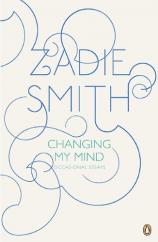Changing My Mind: Occasional Essays
Review
Changing My Mind: Occasional Essays
In addition to her considerable talents as a novelist, Zadie
Smith has been quietly assembling an impressive body of literary
and cultural criticism over the past several years. Those pieces
have been collected in this volume, a virtuosic demonstration of
the workings of a first-class mind expressed in consistently lucid
prose. Smith, who divides her time between New York and London, is
an acute observer of contemporary culture, possessed also with the
intellectual grounding to make her commentaries more than
ephemera.
The first section of the volume consists of six scholarly essays
on writers like Zora Neale Hurston (one of her early literary
inspirations), Nabokov and Barthes, George Eliot, E.M. Forster and
Kafka. The most intriguing (and perhaps controversial) piece in
this section is one entitled “Two Directions for the
Novel,” in which she contrasts the lyrical realism of Joseph
O’Neill’s lavishly praised NETHERLAND with her
preference for the “constructive deconstruction” of
English novelist Tom McCarthy’s experimental REMAINDER.
Smith’s lecture, “Speaking in Tongues,” the
highlight of a section entitled “Being,” is a moving
meditation delivered only a few weeks after the election of Barack
Obama. More than any other essay in the collection, this one puts
her dazzling talents on full display. In it, she moves gracefully
from the story of shedding the accent of her birth
(“Willesden was a big, colorful, working-class sea; Cambridge
was a smaller, posher pond, and almost univocal; the literary world
is a puddle.”) to a discussion of Pygmalion, to an
incisive dissection of Obama’s memoir. Along the way, she
discourses on such subjects as Shakespeare, the religious wars of
17th-century England and Cary Grant. None of this feels as if
it’s calculated to showcase her erudition. Rather, it’s
an invigorating display of the breadth of her learning and of her
ability to knit together seamlessly elements of culture both high
and low.
A close study of Smith’s generous essay “That Crafty
Feeling” (a version of a lecture delivered to Columbia
creative writing students) will repay aspiring writers many times
over. In it, she lays down 10 genial guidelines about the writing
craft, of which this terse admonition about literary influences is
but one example: “Other people’s words are so
important. And then without warning they stop being important,
along with all those words of yours that their words
prompted you to write…Other people’s words are the
bridge you use to cross from where you were to wherever
you’re going.”
The three essays collected under the heading
“Feeling” are the most poignant in the book. Smith
begins with a description of a family Christmas around 1980 (she
was six or so at the time), and then in “Accidental
Hero” recounts her father Harvey’s wartime memories,
including his participation in D-Day (“So much experience
that should be parceled out, tenderly, over years, came to my
father that day, concertinaed into twenty-four hours.”) and
concludes with “Dead Man Laughing,” a sly meditation
that winds its way effortlessly from the gentle fun she pokes at
her father’s sense of humor (he loved “Monty
Python’s Flying Circus” and “Fawlty
Towers”) to a professional critique of the art of comedy.
Smith’s collection winds up with a lengthy reconsideration
of David Foster Wallace’s short story collection, BRIEF LIVES
OF HIDEOUS MEN. In the same vein as the literary criticism that
leads off the volume, it’s a discussion that will challenge
the general reader, but it’s an unsurpassed introduction to
Wallace’s work and an exceptionally generous tribute to a
departed colleague.
The only section of CHANGING MY MIND that mildly disappoints is
“Seeing.” Focusing on the movies, Smith offers an
appreciation of Katharine Hepburn and Greta Garbo, a profile of the
Italian actress Anna Magnani and a series of vignettes from Oscar
weekend 2006. The longest piece in this section collects
Smith’s reviews of mainstream films that year. The problem
with this relatively lengthy chunk of the book is that a good many
of the films Smith critiques (such as the ghastly Get Rich or
Die Tryin’ and Date Movie) are best forgotten
and, in any event, unworthy of her talents.
In a recent essay in the Guardian, Zadie Smith explains
that something she calls “novel nausea” inspired her to
turn to the essay form. “But in a strange circular effect, it
has been the experience of writing essays that has renewed my
enthusiasm for the things fiction does that nothing else
can,” she concludes. “Writing essays on Kafka, on
Nabokov, on George Eliot, on Zora Neale Hurston, I was newly
humbled and excited by the artificial and the fully
imagined.” It’s reassuring to know that a gifted writer
of fiction now has recharged her creative batteries, but these
elegant and thoughtful essays can only inspire the hope that
she’ll return with more soon.
Reviewed by Harvey Freedenberg (mwn52@aol.com) on December 26, 2010
Changing My Mind: Occasional Essays
- Publication Date: October 26, 2010
- Genres: Criticism, Essays, Nonfiction
- Paperback: 320 pages
- Publisher: Penguin (Non-Classics)
- ISBN-10: 0143117955
- ISBN-13: 9780143117957





